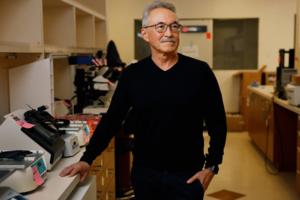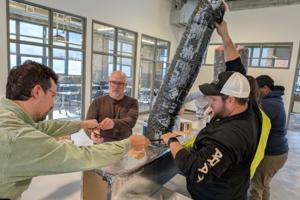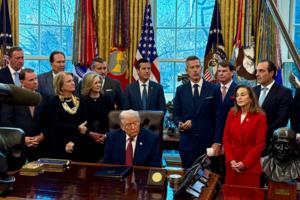Business
/ArcaMax

Watershed moment for San Diego's minimum wage in 2026. Which workers benefit the most
It was just a couple of years ago that the minimum wage landscape in California reached a major milestone — fast food workers would begin earning $20 an hour, a monumental boost in pay over the state’s then hourly rate of $16. It would set a new bar for service workers up and down the state.
That bar is changing yet again, but this time in ...Read more

New Jersey's new minimum wage will be more than double Pennsylvania's
New Jersey’s minimum wage will increase on Thursday.
The new rate of $15.92 an hour is a $0.43 increase from the previous standard, which was set in 2025.
“Eight years ago, Governor Murphy pledged a stronger, fairer economy, and we’re delivering on this commitment by raising New Jersey’s minimum wage again,” Robert Asaro-Angelo, ...Read more

How a San Diego startup's universal flu shot sold for $9 billion
Inside a single-story brick building in Sorrento Mesa is a small lab sprinkled with beakers, test tubes and incubators that is worth billions of dollars.
This is where Cidara, a small San Diego pharmaceutical company, created what the scientific community has talked about for decades — a kind of universal flu shot that fights all forms of ...Read more

Baltimore sues digital lender Dave, alleging the company misled borrowers
Mayor Brandon Scott announced Tuesday that the City of Baltimore has filed a lawsuit against digital lender Dave Inc., accusing the company of luring cash-strapped residents into high-cost, short-term loans through misleading marketing and interest charges.
Baltimore is being represented by the Baltimore City Department of Law and Berger ...Read more

Disney cast member injured blocking Indiana Jones boulder from hitting crowd
BAY LAKE, Florida — A Walt Disney World cast member was injured blocking the massive boulder prop from hitting the audience Tuesday at the Indiana Jones attraction at Hollywood Studios.
Disney confirmed the employee was recovering and the iconic feature of the boulder scene in the Indiana Jones Epic Stunt Spectacular would be changed.
“We�...Read more
Real estate Q&A: Can HOA make me take down holiday decorations?
Q: I live in a homeowners’ association, and I decorated my house and yard for the holidays. They made me take it down under threat of a fine. Are they allowed to do this? – Gunther
A: Living in a community association means following a set of rules and regulations you agreed to when you purchased your home. These rules often govern how you ...Read more
How artificial intelligence became real estate's new secret weapon
CRANBERRY TOWNSHIP, Pennsylvania — Coldwell Banker agent Georgie Smigel used to spend hours digging through spreadsheets and old inquiry lists trying to figure out who might be interested in a new listing.
Now she simply asks her artificial intelligence software who is looking for a $250,000 house in a given Pittsburgh neighborhood or suburb....Read more

These are the Seattle area's Gen Z homeowners. How did they do it?
If you picture a first-time homebuyer in the Seattle area, you probably wouldn’t think of 24-year-old Edwin Nino Delgado with his hip-hop posters taped to the wall of his $770,000 Lake City triplex.
He’s nowhere near the age of the typical first-time homebuyer, which is now a record high of 40 nationwide, according to the National Realtors ...Read more

Gen Zers, just because you can buy a home, should you?
Just because you can buy a home, should you?
It seems like a no-brainer when home prices soar year after year. But experts say first-time homebuyers need to consider factors beyond pure capital before jumping into the market.
The median age of a first-time homebuyer has reached a record high of 40 — a time when most people are settled. But ...Read more

Pentagon to pay Boeing $8.6B to make fighters for Israel, raising concerns
Boeing will design and produce 25 new fighter jets for the Israeli Air Force under a new contract with the U.S. Department of Defense, reigniting concern about the aerospace manufacturer’s connection to the ongoing violence in Gaza.
The Pentagon said Monday it had awarded Boeing an $8.6 billion contract to build and deliver 25 new F-15IA ...Read more

Pa. hemp industry buffeted by lack of framework and controversial new rules
HARRISBURG, Pennsylvania — When the federal government gave hemp-growing the green light in 2018, Josh Bobbert almost literally bet the farm on the crop, figuring the versatile plant was going to be a moneymaker for himself, his wife, and nine children.
Since then, though, devoting a lot of his 61-acre family farm in Lawrence County, ...Read more

Southern California's unlikely AI mecca is this very industrial city
Five miles south of downtown Los Angeles, a single industrial block in Vernon is drawing as much electricity as a small town.
Inside a three-story, 242,000-square-foot building known as LAX01, rows of advanced artificial intelligence chips hum across six data buildings, consuming enough electricity to power more than 26,400 homes for a year. ...Read more

Tucked away in a downtown Chicago office building, fallen e-commerce star Groupon is ready for a comeback
Inside Groupon’s 2-year-old headquarters on the 25th floor of the Leo Burnett Building in downtown Chicago, a giant cat in a spaceship with flashing lights greets visitors in an otherwise staid office tower.
Here, the quirky e-commerce startup once dubbed the fastest-growing company ever, amid Super Bowl ads and ubiquitous media coverage, is ...Read more

How a family of Black entrepreneurs has changed a Miami Starbucks
MIAMI — There was a buzz in the air at a Starbucks near the downtown Miami Brightline station — and it wasn’t only because of the caffeine.
A “Holiday Sip and Shine,” featuring kids’ games, a DJ and drink specials, took over the cafe.
Concessions International, a Black-owned business, operates this Starbucks, and wanted local ...Read more

Let's talk about heat pumps: This Pittsburgh utility is helping to train contractors on the science and art of HVAC
PITTSBURGH — Frank Gillis laid out four sheets of fiberglass inside the Penn College Building Performance Lab in Pittsburgh's Homewood neighborhood.
With a knife, he demonstrated how to cut through the insulation layer, stopping short of the aluminum cover — "like filleting a fish" — and how to fold the sheet into a rectangular duct, ...Read more

Conor Sen: The housing market is moving in favor of Gen Z
The American dream of owning a home has never seemed further out of reach for young people. You can hardly blame Gen Z and younger millennials for adopting an economic nihilism that prioritizes the here and now — whether that’s $400 Lola blankets or risky crypto trading — over stashing money away for a down payment.
But there’s an ...Read more

Ford at odds with Sen. Ted Cruz over January affordability hearing
WASHINGTON — A standoff has developed between U.S. Sen. Ted Cruz and the Detroit Three automakers over executives' attendance at a planned hearing next month on vehicle affordability.
The Texas Republican last month invited the heads of Ford Motor Co., General Motors Co. and Chrysler parent company Stellantis NV to testify Jan. 14 in front of...Read more

With launch day nearing, all eyes on Minnesota's new paid leave program
Minnesota will start the new year with a paid leave law that took years to implement, launching a new benefit — and a new tax — for workers and employers.
Political stakes are high for the success of the program, which a DFL-controlled Legislature passed and Gov. Tim Walz signed into law with a host of other progressive policies in 2023.
...Read more

Neiman Marcus parent sells its Beverly Hills site
LOS ANGELES — The land below the Beverly Hills flagship store of luxury retailer Neiman Marcus has been sold to a New York investor as the owners of the department store chain sell property to pay debts.
Neiman Marcus, which has occupied the 9700 Wilshire Boulevard store since it opened in 1979, will continue to serve customers there as a ...Read more

Meet the 'rockstar CEO' leading Bay Area's unprecedented Super Bowl-World Cup back-to-back
Zaileen Janmohamed hardly had time to update her LinkedIn profile when she received her first and only marching orders from her new boss, Al Guido, the San Francisco 49ers president and board member of the newly formed Bay Area Host Committee.
Go get us Super Bowl 60.
Ten weeks later, the short, spunky Canadian of Indian descent and mother of...Read more
Popular Stories
- Tucked away in a downtown Chicago office building, fallen e-commerce star Groupon is ready for a comeback
- These are the Seattle area's Gen Z homeowners. How did they do it?
- How a family of Black entrepreneurs has changed a Miami Starbucks
- Ford at odds with Sen. Ted Cruz over January affordability hearing
- Pentagon to pay Boeing $8.6B to make fighters for Israel, raising concerns









